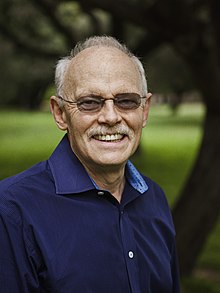| This biography of a living person needs additional citations for verification. Please help by adding reliable sources. Contentious material about living persons that is unsourced or poorly sourced must be removed immediately from the article and its talk page, especially if potentially libelous. Find sources: "James McClelland" psychologist – news · newspapers · books · scholar · JSTOR (February 2013) (Learn how and when to remove this message) |
| James Lloyd McClelland | |
|---|---|
 | |
| Born | (1948-12-01) December 1, 1948 (age 76) Cambridge, Massachusetts |
| Nationality | American |
| Alma mater | Columbia University University of Pennsylvania |
| Awards | Grawemeyer Award in Psychology (2002) Rumelhart Prize (2010) |
| Scientific career | |
| Fields | Psychology |
| Website | stanford |
James Lloyd "Jay" McClelland, FBA (born December 1, 1948) is the Lucie Stern Professor at Stanford University, where he was formerly the chair of the Psychology Department. He is best known for his work on statistical learning and Parallel Distributed Processing, applying connectionist models (or neural networks) to explain cognitive phenomena such as spoken word recognition and visual word recognition. McClelland is to a large extent responsible for the large increase in scientific interest in connectionism in the 1980s.
Early life and education
McClelland was born on December 1, 1948, to Walter Moore and Frances (Shaffer) McClelland. He received a B.A. in Psychology from Columbia University in 1970, and a Ph.D. in Cognitive Psychology from the University of Pennsylvania in 1975. He married Heidi Marsha Feldman on May 6, 1978, and has two daughters.
Career
In 1986 McClelland published Parallel Distributed Processing: Explorations in the Microstructure of Cognition with David Rumelhart, which some still regard as a bible for cognitive scientists. Geoffrey Hinton was a member of the PDP group. McClelland present work focuses on learning, memory processes, and psycholinguistics, still within the framework of connectionist models. He is a former chair of the Rumelhart Prize committee, having collaborated with Rumelhart for many years, and himself received the award in 2010 at the Cognitive Science Society Annual Conference in Portland, Oregon.
McClelland and David Rumelhart are known for their debate with Steven Pinker and Alan Prince regarding the necessity of a language-specific learning module.
In fall 2006 McClelland moved to Stanford University from Carnegie Mellon University, where he was a professor of psychology and Cognitive Neuroscience. He also holds a part-time appointment as Consulting Professor at the Neuroscience and Aphasia Research Unit (NARU) within the School of Psychological Sciences, University of Manchester.
Further information: WickelphoneAwards
- Mind & Brain Prize
- University of Louisville Grawemeyer Award in psychology, 2002
- William W. Cumming prize from Columbia University, 1970
- Research Scientist Career Development Award from the National Institute of Mental Health, 1981—86, 1987—97
- Fellow, National Science Foundation, 1970—73
- Rumelhart Prize, 2010
- C.L. de Carvalho-Heineken Prize, 2014
In July 2017, McClelland was elected a Corresponding Fellow of the British Academy (FBA), the United Kingdom's national academy for the humanities and social sciences.
See also
- Artificial neural networks
- Cognitive science
- Connectionism
- Emergence
- TRACE model of speech perception
References
- "James L. McClelland VITA" (PDF). Archived from the original (PDF) on 2014-10-06. Retrieved 1 Oct 2014.
- ^ "Profile details: James Lloyd McClelland". Retrieved August 7, 2012.
- David E. Rumelhart, James L. McClelland and PDP Research Group (1987). Parallel Distributed Processing: Explorations in the Microstructure of Cognition. MIT Press. ISBN 9780262680530.
- MIND & BRAIN PRIZE - Center for Cognitive Science
- "Recipients". Archived from the original on 2016-03-13. Retrieved 2012-12-10.
- "Dr A.H. Heineken Prize for Cognitive Science". Archived from the original on 2015-09-11. Retrieved 2014-08-16.
- "Elections to the British Academy celebrate the diversity of UK research". British Academy. 2 July 2017. Retrieved 29 July 2017.
External links
| Heineken Prizes | |
|---|---|
| Biochemistry and Biophysics |
|
| Medicine | |
| Environmental Sciences | |
| History | |
| Cognitive Science | |
| Art |
|
- Computational psychologists
- American cognitive neuroscientists
- Speech perception researchers
- Rumelhart Prize laureates
- Stanford University Department of Psychology faculty
- Carnegie Mellon University faculty
- Fellows of the Society of Experimental Psychologists
- Members of the United States National Academy of Sciences
- Fellows of the American Association for the Advancement of Science
- 1948 births
- Living people
- Psycholinguists
- Winners of the Heineken Prize
- Fellows of the Cognitive Science Society
- Corresponding fellows of the British Academy
- APA Distinguished Scientific Award for an Early Career Contribution to Psychology recipients
- 20th-century American psychologists
- 21st-century American psychologists